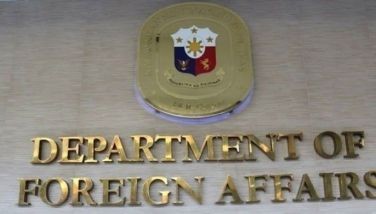MM sinking due to global warming, illegal fishpens, says expert
MANILA, Philippines - The entire Metro Manila has started to “sink” due to global warming and floods and to the rampant setting up of illegal fishponds in nearby provinces, an expert from the University of the Philippines’ Marine Institute said yesterday.
Fernando Siringan made the revelation when he faced the Senate committee on climate change.
Siringan explained the cause of massive flooding in Metro Manila in recent weeks.
“One major point is that the land in Malabon is sinking, and not only in Malabon. Actually, the entire Metro Manila is sinking. And you’ll have to consider that it’s sinking not slowly, it’s sinking at several centimeters per year,” Siringan said.
He also said there is no sense in dredging rivers if it continues to be filled with trash.
He said the rising sea level as well as oil subsidence should be considered in the conduct of anti-flood projects, especially in the Caloocan, Malabon, Navotas and Valenzuela (Camanava) area.
“There are places in Malabon and Pampanga where soil subsidence is at 10 centimeters and half a meter every year, respectively,” Siringan said.
Sen. Loren Legarda, chairperson of the Senate committee on climate change, echoed Siringan’s statements.
“This is not new because we have been saying this even before. Many areas are sinking every year so this should be incorporated in the planning of projects in the affected areas,” Legarda said.
In the long term, there is a need to clear up waterways, rivers and lakes, Legarda said.
She said there is also a need to remove human settlements in major drainage systems.
“We will collate all of these together so that we will be able to have a framework on how to address the massive flooding in the metropolis,” she said.
Dumbfounded
Metro Manila Development Authority Chairman Francis Tolentino and other MMDA executives, meanwhile, were dumbfounded yesterday over the exposé of a senator that a number of the water pumping stations in Metro Manila and Bulacan failed to operate during the recent monsoon rains because of lack of diesel supply.
When confronted by Senate minority leader Alan Peter Cayetano, Tolentino and MMDA engineer Emma Quiambao denied that other pumping stations ran out of gas.
“So are you denying that (the pumping stations) in Binondo, Pandacan, San Andres... stopped because of lack of gasoline?” Cayetano asked the MMDA chairman during a Senate hearing yesterday.
Cayetano also confronted Tolentino for putting up plant boxes on middle islands in EDSA, which apparently became one of the reasons for the heavy flooding of the P. Tuazon tunnel in Cubao, Quezon City at the height of monsoon rains.
But Tolentino explained there were many reasons why there was flooding in the metropolis and this should not be entirely attributed to the pumping stations, which are old and outdated.
Quiambao was designated as chairperson of the MMDA Flood Control and Sewerage Management Office after its previous chairman, Baltazar Melgar, was sacked for the failure of the pumping stations to operate properly.
Tolentino also reported that there are nine flood-prone areas in the metropolis, excluding the Camanava area.
“Metro Manila can never be flood resistant,” Tolentino said, adding that no amount of massive infrastructure development and effort to minimize trash can ensure a flood-free metropolis because a number of areas are “below sea level.”
Flood control fund
Malacañang is releasing P5 billion for flood control projects that have to be immediately undertaken in Metro Manila and nearby areas, Public Works and Highways Secretary Rogelio Singson said yesterday.
He told congressmen that Budget Secretary Florencio Abad is making the money available to his department upon instructions from President Aquino.
“We no longer have money in the department specifically for flood control. So Secretary Abad is taking P3 billion from unobligated funds in our budget and P2 billion from national government savings,” he said.
He said P5 billion is not enough to do all disaster-mitigation measures required to prevent a repetition of the recent flooding caused by monsoon rains and by typhoon “Gener.”
“So we will prioritize high impact projects in Metro Manila and neighboring areas,” he said.
He added that in Central Luzon, his agency is completing a flood control master plan for the Pampanga river basin, which includes Tarlac, Pampanga, Nueva Ecija, and Bulacan.
He pointed out that money for flood control measures that have to be undertaken immediately could come from the national government’s calamity fund.
In his visits to flooded areas, President Aquino has promised to build flood-prevention structures, including dikes in Camanava and Laguna Lake area.
He said the multi-billion-peso Camanava dike built by the previous administration is not serving its purpose of mitigating flooding in the four cities.
Singson also told congressmen that there has to be a “convergence” in the use of funds for projects that could lessen flooding, including pork barrel allocations of members of Congress.
Citing examples, he said irrigation systems and even farm-to-market roads in certain areas could include the rehabilitation of watersheds.
He said small impounding dams and canals could be constructed to trap rainwater, which could later be used to irrigate farms. – With Jess Diaz
- Latest
- Trending































